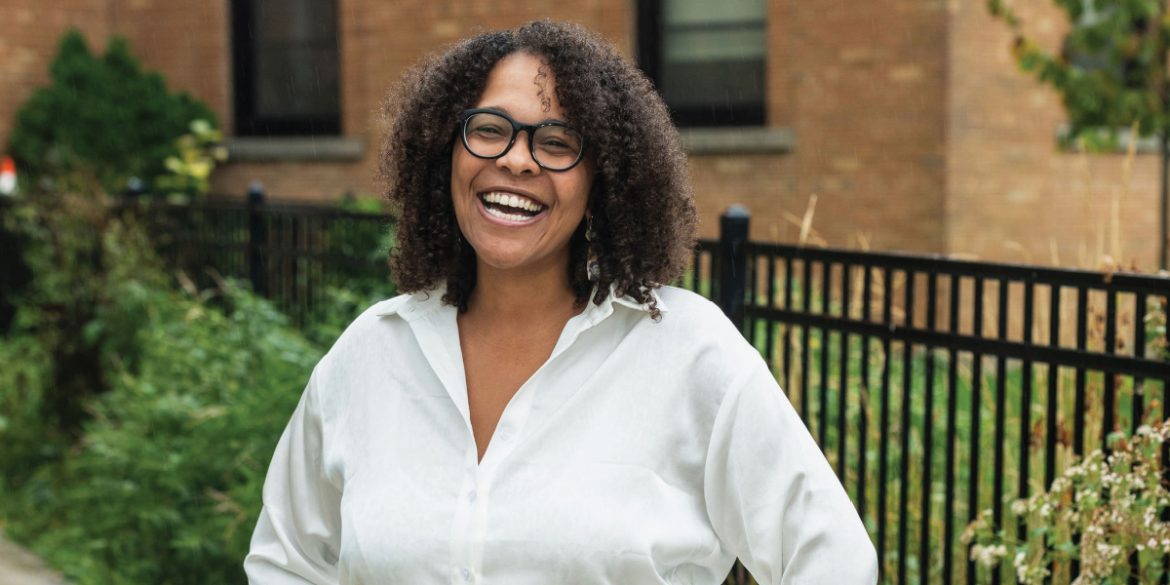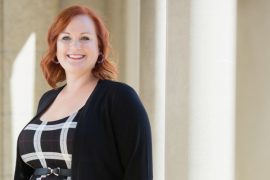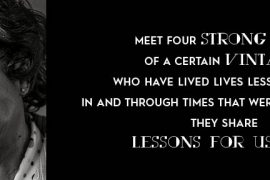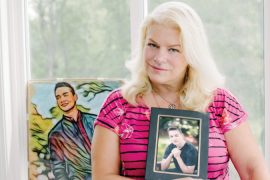By Shelby Rowe Moyer | Photography By Shalicia Johnson
Ali Muldrow will never forget a student she met years ago when she was a guest speaker at a high school English class, discussing spoken word poetry.
Students were asked to examine a poem by Patricia Smith and use it as inspiration for writing their own version. One girl wrote about what it was like to grow up with less in a poem called, “How to be a Low-Income Girl, for Those of You Who Aren’t.”
“To this day I can’t look at this poem and not cry,” Muldrow says. “It’s just so vulnerable. She writes about what it was like for her as a kid to give away her own toys at birthday parties, because she didn’t want to show up empty-handed.”
Muldrow has encountered the immense vulnerability of students’ time and time again, especially earlier in her career, when she was brought in to facilitate spoken word poetry workshops and clubs provided by UW-Madison and the Madison Metropolitan School District’s recreation program. She’s seen how poetry can give students the bravery to talk about being gay or transgender, sharing their personal struggles and fears while on stage in front of their whole school.
Awash with emotion, Muldrow said to the girl: “‘I’m sure you hear this all the time, but you are such a good writer.’ She said, ‘No, no one has ever told me that.’ I was like, ‘Well, it’s absolutely a fact. You are gifted. You are so talented, and I hope you know that you could be a writer.’”
After that day, Muldrow never saw her again. But a few years later, she got a Facebook message from that young woman that read: “I just wanted you to know that I am a writer.”
Lives can be transformed by these small exchanges. Muldrow had many of her own in school growing up, some positive and some negative — all of which has shaped her work encouraging and uplifting the voices of Madison’s youth.
Throughout her career, Muldrow has worked in all aspects of education, from offering poetry workshops, to being employed as a high school security guard, to being a school janitor. For the last four years, Muldrow has been the co-director of GSAFE (Gay Straight Alliance for Schools), a statewide organization that provides youth programming; outlets for activism and advocacy; and educator training on topics like how to support transgender and gender non-conforming youth, preventing bullying and creating a Gay-Straight Alliance club. Muldrow originally joined GSAFE in 2014 as its Racial Justice Youth Organizer, a role that felt more like a calling than a job change, after working previously as a security guard confronting the inequities of pulling mostly Black high school boys out of class.
One of GSAFE’s overarching goals is to create spaces where students feel safe and valued, particularly at school. But Muldrow also wanted the ability to influence school policy and help close opportunity gaps for students of color, so that students feel celebrated in all aspects of their education and, ultimately, their community at large. So in 2019, Muldrow ran for and won a seat on the Madison Metropolitan School Board and is the current president.
This desire to make Madison a better place for youth also stems from her own student experience. When Muldrow graduated from Madison East High School in 2005, she notes most of her Black peers didn’t receive their diploma — in fact, less than 50% of Black students graduated. Most recently, the four-year graduation rate for Black MMSD students is about 65%. It’s an improvement, but there’s still a lot more work to be done to close the gaps, she says, from test scores and learning proficiencies to disciplinary actions that disproportionately affect students of color. (In 2019-20, for example, Black students made up 65% of school arrests and 82% of citations, despite making up just 17.3% of the school high school population).
“That’s one of the reasons why I do this work in my hometown,” Muldrow says in regard to these inequities. “It would be one thing for me to sit back and say nothing’s changed, and the same things that were a problem when I was a kid are still a problem, and that Madison is a horrible place. It’s another thing for me to say, ‘I think I can do something about this, and I think my community is ready to change and wants to change.’”
And though now Muldrow spends much of her time serving youth and students at a higher level, she didn’t want to lose her direct connection to kids. When Muldrow was promoted at GSAFE, it was important to her that she continue teaching its Foundations for Leadership class, facilitated in partnership with MMSD and UW-Madison. High school students are nominated for the class, and they spend evenings studying activism. Muldrow’s students have taken the skills they’ve learned and gone on to organize gun violence and pipeline protests across the U.S. Bleed Shamelessly — a Madison nonprofit that aims to destigmatize menstruation, provides period supplies and fights for tax-free tampons — was founded by a former Foundations for Leaderships student.
The class is structured in a way that enables students to adapt and guide their own course work, an approach called consent culture — something Muldrow learned from one of her middle school teachers, Jessica Hotz, who allowed and encouraged Muldrow to adapt what she was learning after Muldrow silently protested the Euro-centric history material.
“I told her I wanted to learn about how schools have been used to indoctrinate students with inferiority,” Muldrow recalls. “She said, ‘Well, Ali, that’s the study of history.’ She brought me all these resources. I tell people to this day that I never worked harder. She asked me what I wanted to learn, and she cared about what I was learning.”
Muldrow’s educational experience was mostly negative until she got to middle school. As a young, Black kid with a learning disability, she often felt ostracized and, instead of being celebrated for her differences, she felt they were often used against her. Once she reached middle school, however, Muldrow met teacher Amanda Postel, and her education experience changed from one that was deeply discouraging to one that instilled confidence.
“She was the first person who made me feel intelligent at school,” Muldrow says, of Postel, who worked with a lot of struggling students. Postel was always working to connect students with the resources they needed to succeed, be it as simple as a snack or someone who could address a specific need. Muldrow says she was honest and vulnerable, which gave her students the space they needed to do the same.
“She taught me some of the most valuable things I think a person could possibly know about themselves in terms of capacity and ability. She made me feel respected and seen.”
It’s because of teachers like Hotz and Postel that Muldrow has shaped her life’s work around empowering, celebrating, respecting and valuing kids, and giving them platforms that will allow them to reach their full potential, so they make their own impact on the world.
Supporting youth can be a surprisingly difficult buy in for the Madison community at large, she says. When Muldrow was campaigning for school board, she’d sometimes encounter people who said they didn’t have kids, so they weren’t interested in the local schools. So, she’d ask them what they did care about. Climate change? Racial injustice?
“No matter what you care about, school is a place where all of that comes together,” Muldrow says. “The opportunities that they have today will shape the future. Education is our key to tomorrow. I want to live in a better world in the long run. I believe the world I do want connects the world we have right now to the potential that we have in the future.”
Top Three
Here are Ali Muldrow’s primary goals as MMSD school board president.
- Expand access to creative opportunities for students in early childhood by investing in theater, dance and art as opportunities for our students to have every day.
- Address inequity by creating schools that are welcoming to all students and promoting and passing policies that address the specific needs of our most marginalized students.
- Work long-term to unite our community in the interests of our children, schools and educators. This means promoting autonomy of educators in the classroom and inspiring our community to invest in our schools and champion the rights of all students.




